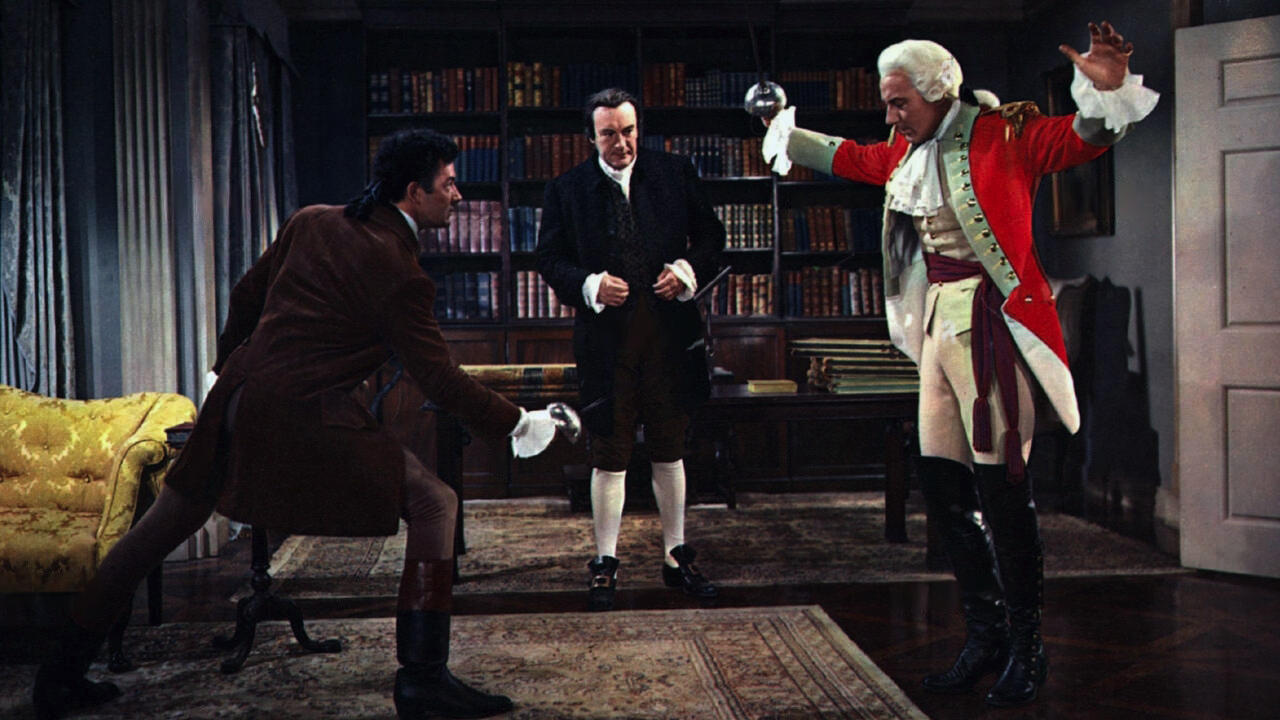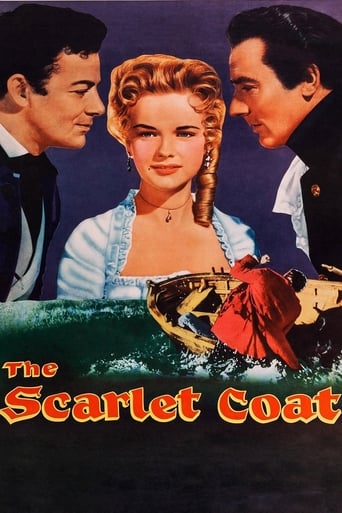Teringer
An Exercise In Nonsense
AshUnow
This is a small, humorous movie in some ways, but it has a huge heart. What a nice experience.
Ariella Broughton
It is neither dumb nor smart enough to be fun, and spends way too much time with its boring human characters.
Zlatica
One of the worst ways to make a cult movie is to set out to make a cult movie.
MartinHafer
It seems rather strange that with the American Revolution being so important that very few films have been made about it...even by Hollywood. In fact, during the 1930s, Hollywood made tons of films about the British Empire and how magnificent it was...which is rather strange as well! While "The Scarlet Coat" is not one of the best of them, it is one of the few American Revolution films you can find.The story purports to be true and while I know nothing about Major Boulton (Cornel Wilde), the other events in the movie are based on the true story of Benedict Arnold and his becoming a traitor to the United States' cause. Boulton is a spy who pretends to be working for the Brits and the film consists of him working hard to determine WHO the British are contacting within the Continental Army. There is nothing wrong with this movie other than the fact that it is a bit talky AND there's a female relationship in the film that seems unnecessary. Wilde is fine, though not one of the best actors of the day. All in all, adequate is the best way to describe this movie.
LeonLouisRicci
Another Movie Directed by the Overrated John Sturgess, this is Another Example of the Stiff, Pedestrian, and Wooden Style that Permeated His Pictures. Some of His Films were Popular but were Mostly Driven by "Star Status", like the Great Escape (1963) and The Magnificent Seven (1960). Both those Films are Above Average but Hardly Deserve their Elevated Status as "Classics".This has One Stodgy Scene after Another, the Movie Barely Moves and the Highlights are the Technicolor Cinemascope Postcard Images and some Good, Interesting Dialog. Anne Francis is a Stunning Beauty but doesn't do much, Cornel Wilde is a Dashing Swordsman but is Robotic if Interested most of the time, but the Standout Performance is Michael Wilding as the Central Character of the Piece Maj. John Andre.The Benedict Arnold Hook is Background and this may have the most Unexciting Action Sequences in a War Film Ever. George Sanders is a Slimy, Sharp-Tongued Heavy and is the Second most Interesting Character on Screen. Overall, Worth a Watch but the Film is so Boring it does No Justice to Any of the People, Time, or Place.
MARIO GAUCI
Somehow, despite numerous screenings on TCM U.K. over the years, I never bothered with this one; then, when it seemed to drop off their schedule, I acquired THE SCARLET COAT – along with a few other genuinely rare Cornel Wilde efforts – on DVD-R (culled, ironically, from one such TV broadcast) through a friend! Anyway, I now begrudge all the more the fact of having overlooked the film for so long since I enjoyed it a good deal; incidentally, for some odd reason, I have never been particularly enthused of pictures set during the American War of Independence – so that may well be the reason why I did not actively pursue this one. Still, after the initial disappointment of it being a pan-and-scan presentation of a Cinemascope title, I found myself drawn into the proceedings – especially in view of the unusual espionage element (which never fails to grip me) but also, equally unexpected, a literate script (Karl Tunberg would subsequently receive sole credit for William Wyler's mammoth BEN-HUR [1959]); accordingly, characterization is well above-average for this sort of thing. Another obvious draw, then, were the principal actors: Wilde as the patriot ordered to defect (by his superior, John McIntire) to the British ranks in order to unearth the mole who is passing them information about the enemy's movements (which turns out to be a prominent military figure, Benedict Arnold, played by Robert Douglas – though, that, in itself was a bit of a giveaway even to viewers unfamiliar with American history!); co-star Michael Wilding is the English officer who takes Wilde under his wing (against the better judgment of doctor comrade George Sanders, amusing in characteristic cynical mode) and suffers the consequences of this blind faith – albeit yielding mutual respect (which not even the woman, Anne Francis, who comes between them can negate!) – with his life. For the record, I almost gave this a *** rating but decided against this given the fact that the film loses some momentum in its last lap – due to the (necessarily) involved plotting, an unfortunate lapse into cliché (Wilde is thrown into prison by his own side at the proverbial eleventh-hour, thus allowing the traitor Arnold to flee and Wilding to be intercepted and face the music all alone!) and over length (even if a fade-out clinch between Wilde and Francis should not have been amiss, to counterpoint the ensuing glumness concerning Wilding's fate). All in all, an interesting, enjoyable and good-looking historical piece encompassing suspense, romance, action (the highlights are perhaps the surprising swashbuckling bouts) and tragedy, the whole being efficiently handled by reliable craftsman Sturges.
theowinthrop
I was glad to see that THE SCARLET COAT, after being absent from television for many years, has begun showing up on cable - usually on TURNER NETWORK. It is one of those films that I have referred to elsewhere that once was shown pretty frequently but then vanished from the small screen.It is not as well recalled as other films about the Revolution - many of which are inferior. People recall 1776 for the solid musical underneath it.They remember THE DEVIL'S DESCIPLE for Laurence Olivier's excellent (and fun) performance as General Burgoyne, and for the good work of his co-stars Burt Lancaster and Kirk Douglas. But they remember THE HOWARDS OF VIRGINIA, a dull film from the early 1940s that may be the most mediocre performance in Cary Grant's career. Except for 1776 the other two films have stars in them (1776 had some good character actors, William Daniel as John Adams - repeating his stage performance fortunately - and Howard De Silva as Ben Franklin - even in the small role of Edward Rutledge there is John Cullum singing that fascinating economic lecture "Mollasses to Rum to Slave".). So it goes with all of the other films - Griffith's America does have a diabolic performance of Lionel Barrymore as Walter Butler, the Tory. LAFAYETTE has Orson Welles portraying Ben Franklin (oddly enough nobody thought of making the musical BEN FRANKLIN IN Paris into a film - with Robert Preston in the lead as on Broadway). Robert Stack starred as JOHN PAUL JONES (a movie sunk by a wooden, lifeless script). Even Al Pacino could not save REVOLUTION. As for Mel Gibson's THE PATRIOT, it collapses in his desire to show sadistic British incidents which never happened (if a British Cavalry officer had burned down an Anglican Church with it's parishioners inside in the South in 1780, King George III - who took his being head of the Anglican Church seriously - would have had that officer hung!). A sad list - fortunately there is 1776 and DRUMS ALONG THE MOHAWK and THE SCARLET COAT.The conspiracy of Benedict Arnold - Sir Henry Clinton - and Major John Andre is a subject that has only appeared in two movies - and oddly enough both were good. One is the comedy THE TIME OF THEIR LIVES, where Abbott and Costello link their colonial characters to the fate of Arnold's local co-conspirators. However, only the first twenty minutes of the film deal with the conspiracy at all (though the plot hinges on clearing Costello's name of treason charges). THE SCARLET COAT is a solid dramatic treat, and wisely concentrates on the real tragic hero in the story: Major John Andre. Yes, he was a spy, and had he succeeded American history would have been part of the British Empire for at least another century (Arnold was selling more than control of West Point and the Hudson - Washington and his staff were scheduled to be there on the day the trap would have been sprung). But unlike Arnold (whatever blows he unfairly received after doing such marvelous service for the American cause up to 1777) Andre never betrayed his country - he was fighting for his king and homeland, and thought he was in the right. Michael Wilding makes this point very eloquently in the film's court-martial scene. As a result, the viewer's sympathies (as well as those of Cornell Wilde's character, and all the other characters in the film) remain with the Major even unto death. It is interesting to note that in the 19th Century the Arnold Conspiracy did remain the subject of American drama - but the play that held the boards was not named "Arnold" but "Andre". He couldn't be saved but we still regret what happened to him.And then there is this 1955 film.

